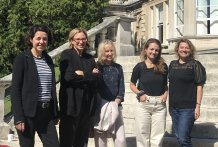Articles

Professor Fiona Handyside and Professor Danielle Hipkins have worked with academics in Italy and France
European partnerships to research depiction of girlhood in the media brings multinational research opportunities for students
Innovative European partnerships set up by University of Exeter academics have created new cross-border research opportunities for students.
Professor Fiona Handyside and Professor Danielle Hipkins have worked with academics in Italy and France to research how girlhood and female adolescence are portrayed in the media, particularly in films.
Their work means students at Exeter, Le Mans Université in France and La Sapienza in Italy, now collaborate as part of their studies, sharing ideas and resources through online technology. A module on coming-of-age films, first delivered at the University of Exeter, is now being shared with students in France and Italy.
Making teaching and learning multi-national allows students to research different responses to film and other media in other countries.
Professor Handyside, who has also worked with pupils in Exeter schools as part of the project, said: “We are examining how nationality and geography affect how we respond to films depicting young women growing up. Students have been able to get first-hand accounts from those with different cultures and languages thanks to the partnerships we have in Italy and France.
“Over time we have gradually built these collaborative links for teaching and research, and they have helped University of Exeter students better reflect on their own responses to these films. This shows the value of UK universities working with their counterparts in Europe. Learning online, as students are doing at the moment, really helps with cultural exchanges such as this.”
The three universities will soon synchronise teaching so students take modules on the topic at the same time. Academics from the three universities have taught at each other’s institutions.
Professor Hipkins, from the University of Exeter’s Modern Languages and Cultures department, said: “This process of creating university exchange between France, Italy, and the UK enables students to become co-creators of research that aims to understand the impact of location on our viewing experiences, and how where we experience adolescence might inform our emotional and intellectual response to seeing those processes enacted on screen.”
Professor Handyside worked at Le Mans Université from November 2018 until April 2019 through a Leverhulme International Academic Fellowship, and with her colleague there, Professor Delphine Letort, developed a module, “Girlhood on Film”, now taught in a similar way at Le Mans. The academics received regional funding from the French government to expand this work to other universities. This grant, along with extra funds from the University of Exeter’s Global Fund enabled a workshop in September 2019 for academics from France, Italy and Norway to discuss contemporary coming-of-age films and TV series, and how Netflix can be a shared resource and object of study for transnational accounts of girlhood experiences.
Professor Hipkins has worked with student interns to examine audience responses to the Italian Netflix series Baby with Professor Romana Andò from La Sapienza. Professor Andò visited Exeter again in December 2019, and Professor Letort in February 2020, and during their visit academics discussed how social media sites such as Instagram and Twitter could be used as part of their teaching on coming-of-age films to allow students to compare and contrast striking images and their responses to them.
Last year a group of students worked with their counterparts in Europe to develop a suite of resources for use in future iterations of the module. This resulted in the website http://blogs.exeter.ac.uk/globalgirlhoods/ where they share their reflections with each other. This offers a significant resource that can be expanded as international collaborative online learning continues to be developed and enhanced.
Date: 3 May 2020
